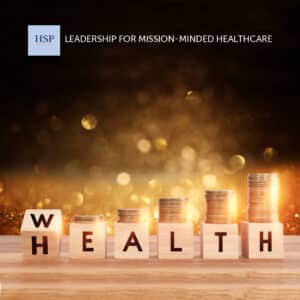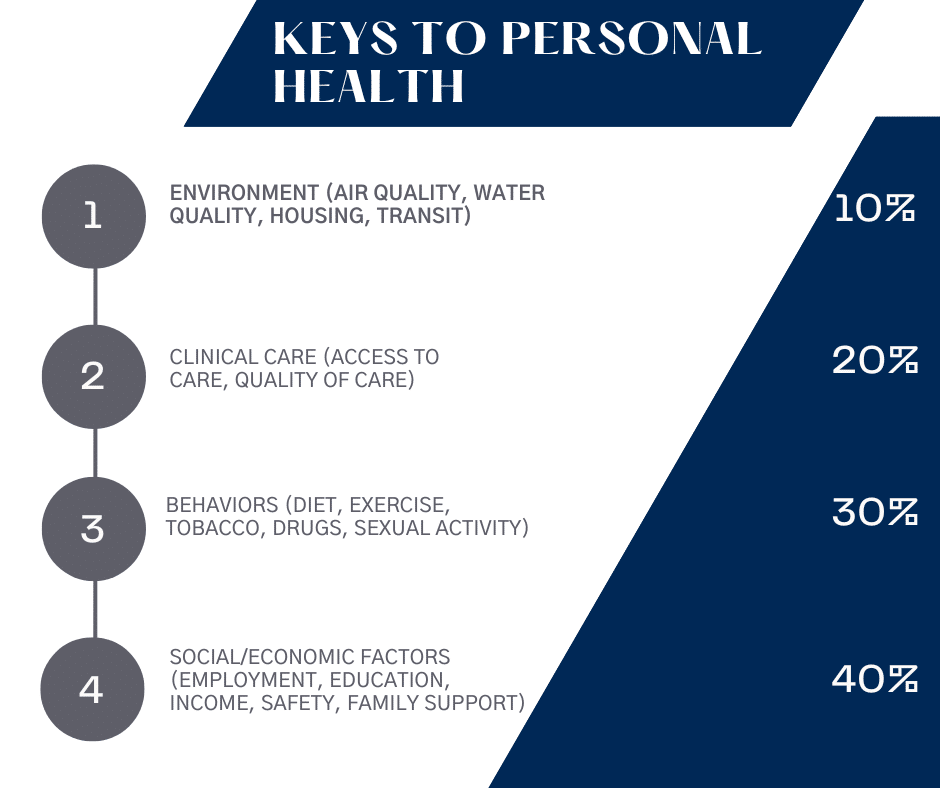By Kurt Mosley, Associations Practice Leader
 How often have you heard the old adage, “Health is wealth?” Well, today it seems the converse is true, “Wealth is health.” The connection between wealth (or the lack of it) and health is becoming more apparent.
How often have you heard the old adage, “Health is wealth?” Well, today it seems the converse is true, “Wealth is health.” The connection between wealth (or the lack of it) and health is becoming more apparent.
Health care associations and organizations searching for executive leaders are looking for insightful professionals who understand this critical connection between financial wellbeing and physical wellbeing.
When considering what makes people in the United States healthy or unhealthy, most Americans are likely to cite lifestyle choices, such as diet and exercise, and genetics as the determining factors, but not poverty. The fact is, however, that one’s zip code has more to do with health than one’s genetic code, as the chart below illustrates:

As these numbers show, 60% of health is determined by social/economic or environmental factors,while only 20% is tied to access to care or quality of care. So, the relative wealth of a community largely shapes the health of its residents.
In 2022, the United States spent $4.3 trillion on healthcare, an estimated $12,555 per person — the highest per capita healthcare costs across the OECD (Organization for Economic Cooperation and Development) countries. Many of these chronically ill patients are trapped in poverty, which undermined their ability to access preventive care and thus, their overall health at an early age.
Since preventive care was largely unavailable, beginning at the prenatal stage, many of these patients developed multiple chronic problems that require intervention their entire lives. The “social determinants of health” – including income, job security, environmental safety and others – are stacked against those who live in poverty, compromising their health and driving up what the nation pays for healthcare.
For years, many healthcare policy makers were wedded to the idea that inefficiency was the root cause of high healthcare spending in the U.S. They pointed out that communities like Grand Junction, Colorado spend less money on healthcare and achieve better outcomes than communities like McAllen, Texas. What was left out of the equation was the relative wealth of communities like Grand Junction and the relative poverty of communities like McAllen.
The late Richard “Buz” Cooper, a highly regarded oncologist and healthcare policy analyst at the University of Pennsylvania, was one of the first to point out the poverty/health connection in his landmark book Poverty and the Myths of Healthcare Reform, published in 2016 by John Hopkins University Press. He argued that addressing poverty was a better way to reduce healthcare spending than looking for “efficiencies” that may not exist.
As Dr. Cooper observed, providing a homeless person with a pair of shoes is much less expensive than treating his frost-bitten feet. Dr. Cooper’s analysis, which was disputed at the time, is proving to be prescient.
COVID-19 has only reinforced his point. The virus has infected people from all economic stations, but it has been particularly prevalent and damaging to people who reside in poorer, disadvantaged communities. As a report in Frontiers in Sociology states:
“Results for the number of deaths confirmed to be caused by Covid-19 demonstrated a pattern whereby the number of deaths was greater in areas of relatively greater poverty later in the pandemic. Furthermore, a larger number of deaths was associated with a larger percent of county residents living in poverty…” (Poverty and Covid-19. Frontiers in Sociology. June 15, 2020).
###
About HealthSearch Partners: HealthSearch Partners
is focused on recognizing income as a determining factor in individual wellbeing when working with clients and candidates. To learn more, contact me at Kurtm@HealthSearchPartners.com, 214.392.3936.
Kurt Mosley is the Leader of the Associations Practice for HealthSearch Partners, a national healthcare executive search firm. Mr. Mosley has more than 30 years of healthcare staffing and consulting experience. Cited by U.S. News & World Report, USA Today, Modern Healthcare and many other publications, Mr. Mosley is nationally recognized for his healthcare staffing expertise. He addresses dozens of healthcare professional organizations each year and he is a member of the Executive Speakers Bureau. He has addressed more than 90 healthcare professional organizations such as the State Hospital Association Executive Forum and the keynote presentation to the American Society of Medical Society Executives. In addition to his executive search responsibilities, he will continue speaking on behalf of HealthSearch Partners, sharing industry insights and thought leadership on the pressing issues facing healthcare professionals daily including “The Critical Connection Between Health and Wealth.”